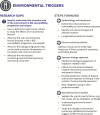Challenges in IBD Research: Environmental Triggers
- PMID: 31095702
- PMCID: PMC6787673
- DOI: 10.1093/ibd/izz076
Challenges in IBD Research: Environmental Triggers
Erratum in
-
Corrigendum to Challenges in IBD Research: Environmental Triggers.Inflamm Bowel Dis. 2019 Nov 14;25(12):e171. doi: 10.1093/ibd/izz125. Inflamm Bowel Dis. 2019. PMID: 31290963 Free PMC article. No abstract available.
Abstract
Environmental triggers is part of five focus areas of the Challenges in IBD research document, which also includes preclinical human IBD mechanisms, novel technologies, precision medicine and pragmatic clinical research. The Challenges in IBD research document provides a comprehensive overview of current gaps in inflammatory bowel diseases (IBD) research and delivers actionable approaches to address them. It is the result of a multidisciplinary input from scientists, clinicians, patients, and funders, and represents a valuable resource for patient centric research prioritization. In particular, the environmental triggers section is focused on the main research gaps in elucidating causality of environmental factors in IBD. Research gaps were identified in: 1) epidemiology of exposures; 2) identification of signatures of biological response to exposures; and 3) mechanisms of how environmental exposures drive IBD. To address these gaps, the implementation of longitudinal prospective studies to determine disease evolution and identify sub-clinical changes in response to exposures is proposed. This can help define critical windows of vulnerability and risk prediction. In addition, systems biology analysis and in silico modeling were proposed as approaches to integrate the IBD exposome for the identification of biological signatures of response to exposures, and to develop prediction models of the effects of environmental factors in driving disease activity and response to therapy. This research could lead to identification of biomarkers of exposures and new modalities for therapeutic intervention. Finally, hypothesis-driven mechanistic studies to understand gene-environment interactions and to validate causality of priority factors should be performed to determine how environment influences clinical outcomes.
Keywords: Crohn’s disease; antibiotic; diet; environment; epidemiology; exposome; in silico modeling; pollutant; smoking; ulcerative colitis; virus.
© 2019 Crohn’s & Colitis Foundation. Published by Oxford University Press. All rights reserved. For permissions, please e-mail: journals.permissions@oup.com.
Figures
References
-
- Pizarro TT, Stappenbeck TS, Rieder F et al. . Challenges in IBD research: preclinical human IBD Mechanisms. Inflamm Bowel Dis. 2019;25(Suppl 2):S5–S12. - PubMed
-
- Denson LA, Curran M, McGovern DPB et al. . Challenges in IBD research: precision medicine. Inflamm Bowel Dis. 2019;25(Suppl 2):S31–S39. - PubMed
-
- Scott FI, Rubin DT, Kugathasan S et al. . Challenges in IBD research: pragmatic clinical research. Inflamm Bowel Dis. 2019;25(Suppl 2):S40–S47. - PubMed


